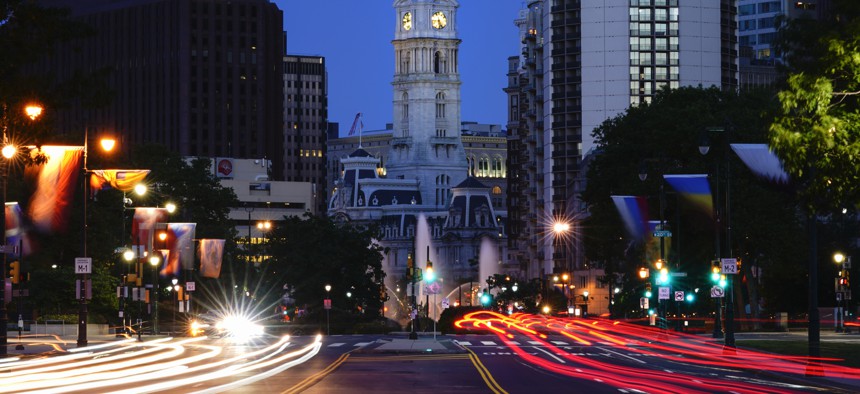67% of Cities Plan to Use ARPA for Lost Revenue

In this slow-shutter speed exposure, shown is City Hall in Philadelphia, Thursday, June 24, 2021. AP Photo/Matt Rourke
Cities are more likely to use money to replace lost tax revenues than to spend on infrastructure, according to a National League of Cities report.
Two-thirds of cities expect to use American Rescue Plan Act money to cover lost revenues as city financial officers budgeted for continued revenue declines in fiscal 2021, according to the National League of Cities’ annual fiscal survey.
The findings, included in the report released Tuesday, underscore how important federal funding has been for municipalities as they weathered the economic impacts of the coronavirus pandemic, said Clarence Anthony, NLC’s CEO and executive director.
The $46 billion distributed directly to cities through ARPA “is a game changer,” he said as he spoke Tuesday at a panel discussion about the NLC report.
“Without it, local governments were facing painful financial choices including layoffs of municipal employees and cutting essential services all in order to balance their budgets,” he said.
Cities derive revenue from a variety of sales, property and income tax sources, so they were not all equally impacted by the pandemic's economic downturn. But losses were significant enough that at least 18% of cities said they intend to use between 81% and 100% of their ARPA allotments to cover lost revenue, the NLC survey found.
Philadelphia is among those cities. It plans to put all $1.4 billion of its ARPA funding toward covering lost revenue, said budget director Marisa Waxman as she spoke at the NLC panel discussion.
The problem stems from the dramatic loss of revenue the city experienced when commuters stopped coming to the city to work and it lost out on wage tax revenue, Waxman said.
Large employers immediately changed their withholdings for employees that began working from home, Waxman said. Commuters who no longer work in the city have three years to request wage tax refunds, so future wage tax declines are also expected.
Because of the drop in revenue, Philadelphia has dialed back spending on services and programs and put off major projects such as the replacement of public safety radios, she said.
“It is a little unsatisfying to the public because they want to know what we are going to get,” Waxman said of all the talk of federal aid. “It’s new money for old stuff.”
Top Priorities for Cities
The NLC report surveyed budget officers from 444 cities on their budgets, financial outlooks and spending priorities.
Of the top three priorities city budget officers have for APRA funding, the survey found that 67% intend to use the federal aid to cover lost revenue. Fifty-four percent said they plan to use the money to cover negative economic impacts of the pandemic, such as providing aid to affected households or businesses.
While cities can use the ARPA money on certain infrastructure improvements, such as broadband, water and sewer upgrades, only about a quarter of cities said they will spend it on water or sewer projects. Twelve percent said they plan to use it on broadband.
The NLC’s analysis from last year painted a grim picture of city finances. This year’s report notes that fiscal 2020 marked the first time since the Great Recession that the majority of cities experienced revenue losses. While budget declines were also projected for fiscal 2021, city financial officers were more optimistic.
Eight in 10 city finance officers reported their city was less able to meet its financial needs in fiscal 2020. But sentiments reversed in fiscal 2021, with 65% of finance officers reporting that their cities were better able to meet fiscal needs than the prior year, due in part to the addition of federal relief funding.
Andrea Noble is a staff correspondent with Route Fifty.
NEXT STORY: Best States to Save for Retirement





